This week at the Alfred Research Alliance, we welcome significant funding for vital research; celebrate important appointments and promotions that will further our work; discover a way to better predict melanoma risk; note an alarming spike in syphilis presentations; launch a trial to help desk-bound people tackle their diabetes and publish new reports & research summaries. Plus, we stand with our LGBTQ(IA)+ community by marking IDAHOBIT.
MONASH UNIVERSITY
Federal Budget delivers important MRFF funding boost
 Congratulations are in order for five Monash researchers, who have been awarded grants from the Medical Research Futures Fund (MRFF) in this year’s federal budget. Prof David Kaye, A/Prof Andrew Wei, Prof Orla Morrissey, Prof Erica Wood, and A/Prof Joseph Doyle, all received grants to further their research, which spans everything from blood cancer to AML, burns surgery and artificial hearts. Read more…
Congratulations are in order for five Monash researchers, who have been awarded grants from the Medical Research Futures Fund (MRFF) in this year’s federal budget. Prof David Kaye, A/Prof Andrew Wei, Prof Orla Morrissey, Prof Erica Wood, and A/Prof Joseph Doyle, all received grants to further their research, which spans everything from blood cancer to AML, burns surgery and artificial hearts. Read more…
Funding to make brain stimulation therapy more widely accessible
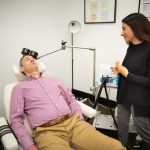 A line in this week’s federal budget allocating A$288.5 million to repetitive transcranial magnetic stimulation (rTMS) therapy might pass most people by. But this previously unfunded brain stimulation technique will now be available on the Medicare Benefits Schedule for people with depression that hasn’t responded to other treatments. Read more about this little-known technique here…
A line in this week’s federal budget allocating A$288.5 million to repetitive transcranial magnetic stimulation (rTMS) therapy might pass most people by. But this previously unfunded brain stimulation technique will now be available on the Medicare Benefits Schedule for people with depression that hasn’t responded to other treatments. Read more about this little-known technique here…
MONASH SCHOOL OF PUBLIC HEALTH & PREVENTIVE MEDICINE
New genomic tool advances melanoma risk prediction in older Australians
 Monash SPHPM researchers led by Dr Paul Lacaze have developed a new, easily-understandable genomic risk score for melanoma (skin cancer), and shown it to be of value when used to predict melanoma risk in older people. Their recently published findings describe how an individual’s genomic risk of developing melanomas may be influenced by numerous genetic changes across their DNA which, collectively, can cause a sharp increase in risk. Read more…
Monash SPHPM researchers led by Dr Paul Lacaze have developed a new, easily-understandable genomic risk score for melanoma (skin cancer), and shown it to be of value when used to predict melanoma risk in older people. Their recently published findings describe how an individual’s genomic risk of developing melanomas may be influenced by numerous genetic changes across their DNA which, collectively, can cause a sharp increase in risk. Read more…
ALFRED HEALTH & MONASH CENTRAL CLINICAL SCHOOL
Syphilis epidemic evolving at an alarming rate
 A 220 per cent spike in syphilis infections in women has experts warning an ‘epidemic’ is in place and swift action is required to bring it under control. Epidemiologist A/Prof Eric Chow says the epidemic, which was once focussed on gay men in inner Melbourne, has now become much more generalised and has spread to the outer suburbs, according to recent mapping conducted at the Melbourne Sexual Health Centre. Read more…
A 220 per cent spike in syphilis infections in women has experts warning an ‘epidemic’ is in place and swift action is required to bring it under control. Epidemiologist A/Prof Eric Chow says the epidemic, which was once focussed on gay men in inner Melbourne, has now become much more generalised and has spread to the outer suburbs, according to recent mapping conducted at the Melbourne Sexual Health Centre. Read more…
MONASH CENTRAL CLINICAL SCHOOL
Intergenerational and lifelong chronic pain starting in early life
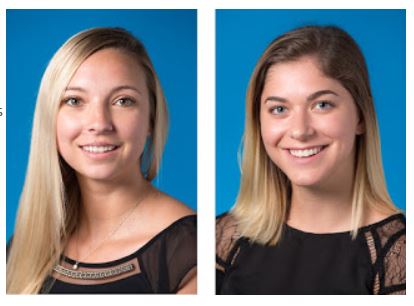 Chronic pain causes a great burden to those affected, their families, workplaces and the health system. Now, new research by from the Monash Trauma Group at the CCS Department of Neuroscience, shows there is a difference in both gender and type of adverse childhood experience in the expression of specific biomarkers linked to chronic pain. Read more…
Chronic pain causes a great burden to those affected, their families, workplaces and the health system. Now, new research by from the Monash Trauma Group at the CCS Department of Neuroscience, shows there is a difference in both gender and type of adverse childhood experience in the expression of specific biomarkers linked to chronic pain. Read more…
Dr Mastura Monif proted to Senior Research Fellow
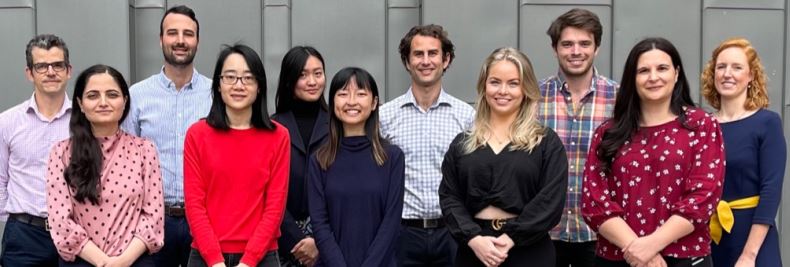
Congratulations to Dr Mastura Monif (Department of Neuroscience) on her successful promotion to Senior Research Fellow! Prof Terry O’Brien said, “Congratulations Mastura. A well-deserved recognition of your hard and strategic work building your academic career and research group.” Dr Monif’s group (pictured) has grown substantially after a number of successful grant applications. Read more…
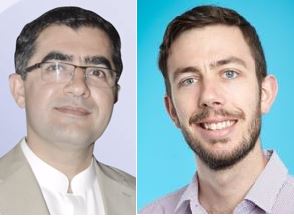 Congratulations to Dr Waheed Khan and Dr Matthew Snelson, both in Central Clinical School’s Department of Diabetes, on their successful Diabetes Australia Research Program (DARP) grants, each approximately $60,000, to further their important studies. Read more…
Congratulations to Dr Waheed Khan and Dr Matthew Snelson, both in Central Clinical School’s Department of Diabetes, on their successful Diabetes Australia Research Program (DARP) grants, each approximately $60,000, to further their important studies. Read more… In 2004, 17 May was established as the International Day Against Homophobia, Transphobia and Biphobia (IDAHOBIT). Since then, commemorations have taken place in more than 132 countries globally. This year, Monash CCS provided a range of opportunities to get involved and also featured the lived experience of LGBTQ(IA)+, featuring Fredrick Applegren. Read his story here…
In 2004, 17 May was established as the International Day Against Homophobia, Transphobia and Biphobia (IDAHOBIT). Since then, commemorations have taken place in more than 132 countries globally. This year, Monash CCS provided a range of opportunities to get involved and also featured the lived experience of LGBTQ(IA)+, featuring Fredrick Applegren. Read his story here…
BAKER HEART AND DIABETES INSTITUTE
Trial tests effectiveness of sedentary intervention in diabetes
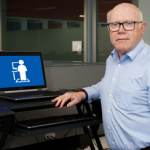 An innovative Melbourne trial is empowering desk-based workers with type 2 diabetes to take a stand — literally — with a physical activity program for those returning to the office or facing more time working from home. Physical activity experts at the Baker Institute are hoping to recruit 250 Melbourne desk-based workers with type 2 diabetes to see if reducing & breaking up sitting time helps with their glycaemic control. Read more…
An innovative Melbourne trial is empowering desk-based workers with type 2 diabetes to take a stand — literally — with a physical activity program for those returning to the office or facing more time working from home. Physical activity experts at the Baker Institute are hoping to recruit 250 Melbourne desk-based workers with type 2 diabetes to see if reducing & breaking up sitting time helps with their glycaemic control. Read more…
Advancing understanding of exercise training and healthy ageing
 The Baker Institute’s focus on exercise training, healthy ageing and cardiovascular function will be enhanced by the recent promotion of Dr Erin Howden to head up the Human Integrative Physiology laboratory. This appointment will further consolidate the Institute’s expertise in physical activity and sports cardiology research, helping Australians live healthier for longer. Read more…
The Baker Institute’s focus on exercise training, healthy ageing and cardiovascular function will be enhanced by the recent promotion of Dr Erin Howden to head up the Human Integrative Physiology laboratory. This appointment will further consolidate the Institute’s expertise in physical activity and sports cardiology research, helping Australians live healthier for longer. Read more…
Grant success for AMEND-CRT Trial
 Prof Tom Marwick‘s team, together with Prof David Kaye, colleagues at The Alfred and the Baker Department of Cardiometabolic Health, has been awarded $991,198 for the AMEND-CRT Trial which seeks to show that an echocardiographic selection process may reduce the non-responder rate for patients receiving — but not benefiting from — cardiac resynchronisation therapy (CRT) after heart failure.
Prof Tom Marwick‘s team, together with Prof David Kaye, colleagues at The Alfred and the Baker Department of Cardiometabolic Health, has been awarded $991,198 for the AMEND-CRT Trial which seeks to show that an echocardiographic selection process may reduce the non-responder rate for patients receiving — but not benefiting from — cardiac resynchronisation therapy (CRT) after heart failure.
BURNET INSTITUTE
IMPACT 2021
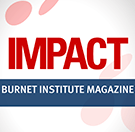 Burnet Institute scientists aspire to achieve better health for all. The Institute has just released its Autumn IMPACT magazine, where you can read the latest stories from those on the frontline of medical research and public health innovation, with in-depth feature stories & analysis on everything from COVID-19, to maternal and child health, viral hepatitis and other major health issues. Read more…
Burnet Institute scientists aspire to achieve better health for all. The Institute has just released its Autumn IMPACT magazine, where you can read the latest stories from those on the frontline of medical research and public health innovation, with in-depth feature stories & analysis on everything from COVID-19, to maternal and child health, viral hepatitis and other major health issues. Read more…
Dr Nick Scott wins Burnet Institute Gust-McKenzie Medal
 Congratulations to Dr Nick Scott, one of Australia’s leading infectious disease modellers and Head of Burnet’s Modelling and Biostatistics Group, who is the Institute’s Gust-McKenzie Medallist for 2021. He and his team have played a key part in informing governments and policy makers on the best approach to addressing diseases like malaria, HIV, TB, viral hepatitis and, during 2020, COVID-19. Read more…
Congratulations to Dr Nick Scott, one of Australia’s leading infectious disease modellers and Head of Burnet’s Modelling and Biostatistics Group, who is the Institute’s Gust-McKenzie Medallist for 2021. He and his team have played a key part in informing governments and policy makers on the best approach to addressing diseases like malaria, HIV, TB, viral hepatitis and, during 2020, COVID-19. Read more…
Burnet Institute Annual Report Released
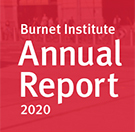 2020 has been acknowledged as ‘one of the most challenging in Burnet Institute’s history, but also one of our most successful’, in the Institute’s 2020 Annual Report presented to the Institute’s virtual Annual General Meeting on 19 May. In his Director’s Message, Prof Brendan Crabb AC paid tribute to Burnet’s significant contribution to Australia’s amazing ‘COVID-zero’ outcome during the coronavirus pandemic. Read more…
2020 has been acknowledged as ‘one of the most challenging in Burnet Institute’s history, but also one of our most successful’, in the Institute’s 2020 Annual Report presented to the Institute’s virtual Annual General Meeting on 19 May. In his Director’s Message, Prof Brendan Crabb AC paid tribute to Burnet’s significant contribution to Australia’s amazing ‘COVID-zero’ outcome during the coronavirus pandemic. Read more…
